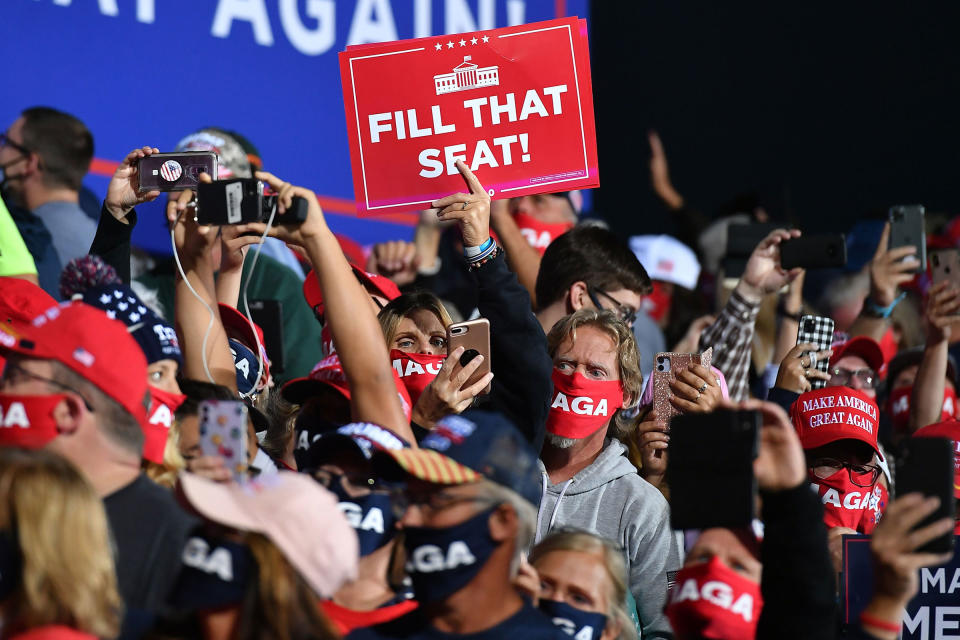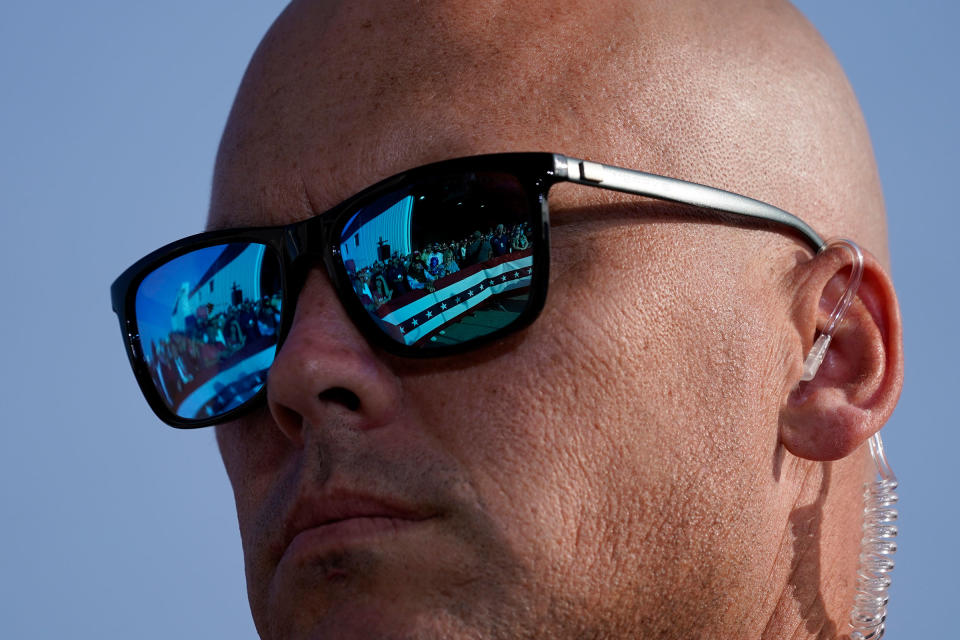'Fill That Seat!' How Donald Trump Is Weaponizing His Supreme Court Pick on the Campaign Trail

President Trump, attends his 'Great American Comeback' rally at the Toledo Express Airport in Swanton, Ohio on Sept. 21, 2020. Credit - Tannen Maury—EPA-EFE/Shutterstock
For decades, presidential candidates have been coy about who they would put on the Supreme Court, sticking with the tradition of consulting with Senate on the choice.
Not Donald Trump.
It was one of Trump’s most successful political innovations in 2016: he promised to pick a future Supreme Court justice from a set list of conservative legal minds that he released to the public five months before the polls. The list reassured uneasy conservatives that Trump, with no political experience and having changed his political affiliation several times, wouldn’t be a wildcard on the courts and was serious about reshaping the judicial branch in their image.
Now, faced with a Supreme Court vacancy following the death of Justice Ruth Bader Ginsburg, Trump is weaponizing the once novel move by demanding his Democratic opponent Joe Biden release his own list of potential nominees. In Swanton, Ohio, on Monday night, Trump spoke from a podium with the full expanse of Air Force One behind him and challenged Biden to release a list of his picks for the Supreme Court. “He doesn’t want to show who his judges are,” said Trump. “He doesn’t want to do that because if you found out who he was going to pick, he would be unelectable.”

The demand, which Trump has made repeatedly over the past two weeks, attempts to create a new litmus test for a presidential race. Biden has resisted, saying that Supreme Court nominees should be put forward in consultation with the Senate and releasing a campaign list would skip that step.
It’s another example of Trump driving through a political norm to gain an edge. In a 2016 presidential debate, he threatened to launch a criminal investigation into his political rival Hillary Clinton if he won. He refuses to release his tax returns, a convention followed by candidates for four decades, saying an Internal Revenue Service audit prevents him from doing so. (It doesn’t.) In August, he accepted his party’s nomination using the White House as a political prop.
Even Trump’s process for picking the next Supreme Court Justice has become part of the traveling Trump show. At a speech at an airplane hangar in Dayton during his swing through Ohio on Monday, Trump told hundreds of supporters, “We are working very hard on getting a third Supreme Court Justice,” sparking chants of “Fill that seat!” He said he’d like to take a “free poll” and asked the crowd to cheer if they would like to see a woman or a man named to the court. More people cheered for a woman.

Trump will be meeting five top candidates for the job this week and said on Monday that he plans to make an announcement as soon as Saturday, a day after Ginsburg is scheduled to lie in state at the U.S. Capitol. His leading candidates are judges Amy Coney Barrett of the United States Court of Appeals for the Seventh Circuit and Barbara Lagoa of the United States Court of Appeals for the Eleventh Circuit.
Biden has defended his decision to not release a list of potential justices, saying he will consult with the Senate on his picks, as is the tradition. “We can’t keep rewriting history, scrambling norms, ignoring our cherished system of checks and balances,” Biden said during a speech on Sunday.
Though Supreme Court justice picks are a strong motivating factor for Republican voters, Trump may face some headwinds politically as the fight over the court heats up. The battle over the Supreme Court is increasingly energizing Democrats as well. Before Ginsburg’s death, 48% of Democratic voters said the court is “very important,” versus 60% after her death, a Politico/Morning Consult poll conducted after Ginsburg’s death found.
The same poll found that more total voters, regardless of party, want the winner of the presidential election on Nov. 3 to nominate the next Supreme Court Justice. Half of voters polled said the election should determine who picks the next justice, 37% said Trump should select Ginsburg’s replacement while he is still president, and 12% had no opinion.

Trump repeatedly played up the importance of the pick on Monday during his visit to Ohio, where Biden is running close to Trump in a state Trump won by 8 points in 2016. Supreme Court justices “set the course of our country for many years to come whether it is on life, the second amendment, many things,” Trump said during his outdoor campaign rally in Swanton. Biden’s selections for the court will “mutilate the law,” Trump said.
Trump will continue to goad Biden about the list, a White House official says. “Biden doesn’t have a good response” to not releasing his own list, the official says, and Trump’s campaign will continue to try to paint that as a liability, saying Biden is hiding the fact that he plans to name far-left thinkers to the court.
“It’s a good issue for us,” the official says.

